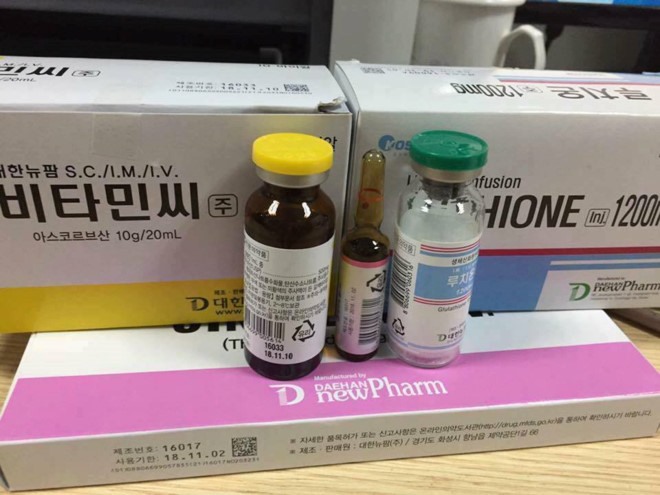

Vietnamese women are advised to think carefully before taking intravenouis skin whitening injections, medical experts say.
 |
| Skin-whitening substances advertised by beauty spas. — Photo from Facebook |
HÀ NỘI — Vietnamese women are advised to think carefully before taking intravenouis skin whitening injections, medical experts say.
The advice follows a growing trend of women lured by spas in Ha Noi and HCM City promising to turn them "into Snow White in a short time"", reported the online newspaper news.zing.vn.
A search for “tiêm trắng da” on Google or Facebook turns up a range of beauty spas offering this service at various price levels, depending on the fame of the spas.
A well-known spa charges about VNĐ85 million (US$3,700) for a package of ten injections. An ordinary spa in Hà Nội’s Hai Bà Trưng District offers a 10injection deal for VNĐ15 million ($660).
Aesthetic Dr Vũ Sơn, a graduate of the Việt Nam Military Medical University, warned that every substance injected into human veins must be allowed by the US Food and Drug Administration. At present, the FDA had yet to approve any injectable drugs for skin whitening or lightening, he said.
Sơn said the process of directly injecting skin-whitening fluid into veins could cause anaphylaxis, acute allergic reaction, which if not treated right away could be fatal. Women are therefore advised to carefully consider such treatment, he added.
According to medical experts, skin-whitening liquids that beauty spas use include Glutathione and vitamin C. Glutathione is a substance that can inhibit the body’s natural production of melanin, the pigment that gives our skin its color, produced by activation of the enzyme Tyrosinase. However, abuse of using Glutathione could cause renal failure, blood poisoning, skin necrosis, and even death, medical experts said.
In an article on the online Dân Việt newspaper, Nguyễn Mạnh Hùng, deputy director of the Hà Nội Dermatology Hospital, said people should also be careful when taking vitamin C injections into their veins because it could lead to anaphylaxis. Hùng said he had a patient who died of acute allergic reaction after injecting vitamin C intravenously.
A Facebooker named Nguyễn Phương Thảo of HCM City said she was an aesthetic doctor and worked at a beauty spa. Five years ago, she already piloted the injection of Glutathione to make her skin whiter. After four injections, her skin began to lighten. She injected herself evvery three days, but she found two areas around her shoulders were reddish and thick after her sixth injection. She stopped treatment and her skin returned to its natural color 10 days later.
Thảo said women should not take skin whitening injections.
The Ministry of Health has not approved skin-whitening injections on the list of permitted medical techniques, a representative told the Tuổi trẻ (Youth) online newspaper.
In the meantime, the FDA has warned on its website that some consumers seeking to change their skin color are turning to injectable products that are potentially unsafe and ineffective, and might contain unknown harmful ingredients or contaminants.
“These products pose a potentially significant safety risk to consumers. You’re essentially injecting an unknown substance into your body—you don’t know what it contains or how it was made,” says In Kim, a pharmacist at the FDA.
Medical practitioners also warn that beyond the potential harm from the product itself, improper or unsafe injection practices may transmit disease, cause infection and result in serious injury. —VNS




